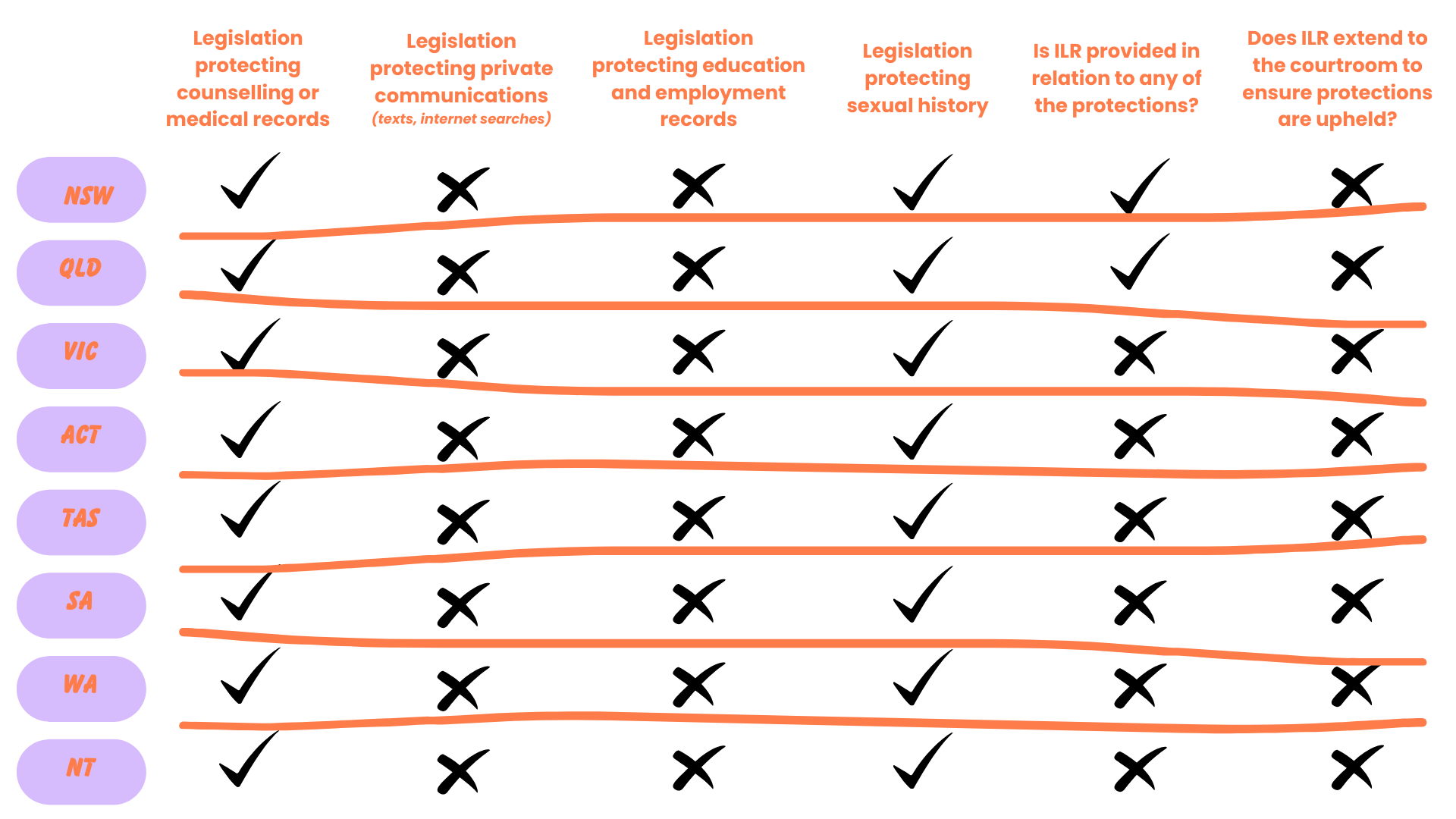
Victims are brave enough to take the stand,
but who stands for them?
Independent legal representation for victims
Right now, victims of sexual violence across Australia are not represented in the criminal case against their own perpetrator. The prosecution’s job is to represent “the state”, not the individual victim. So, despite the entire system depending on the victim’s willingness to speak up and cooperate with the state, there is no one to advocate for their interests.
Victims voice a lack of agency, inconsistent communication and feelings of isolation throughout the criminal system. Many are unaware of their rights to information and privacy, and there is no meaningful avenue for redress when those rights are evaded.
Independent Legal Representation (ILR) would ensure that victims are afforded their own lawyer before, during and after proceedings, to advise them on specific issues, explain the legal process and represent them in situations where their privacy is invaded.
Australia lags behind many countries which afford ILR to victims. Ireland, Germany, India, Japan and Scandinavia, among others, see higher reporting and continued engagement in the legal process. By protecting the victims’ privacy, ILR boosts victims’ confidence and decreases harassment from defence, which leads to more successful prosecution and lessens the re-traumatisation of victims. In the long-term, this reduces health costs and leads to better employment outcomes.
Why is this solution our priority?
- Victims’ rights charters are vague and legally unenforceable. Departures from legal procedure require legal intervention.
- The Office of Commissioner of Victims’ Rights is inconsistent across states, and typically not independent from political influence. The Commissioners do not act for the victim.
- Support workers cannot provide legal advice. If they have capacity, they can assist victims to report to police, but this alerts defence counsel of the presence of counselling records, which are regularly accessed in an attempt to discredit or intimidate the victim. The support worker may then be required to give testimony in trial.
- Witness assistance/liaison officers lack continuity, and victims voice feeling frustrated by a lack of communication. Regardless, these services are affiliated with the prosecution, which influences feelings of support by the victim.
- Judge-alone trials currently lack supporting evidence. Judges can hold false beliefs about rape, so we’d need to consider public review schemes into judicial conduct, first.
- There is no evidence that non-legal supports result in any improvements in the treatment of complainants, or in the upholding of procedural justice. Only a legal representative with standing can ensure the respectful treatment of the victim at trial.
The role of independent legal representation
- Prior to reporting, ILR can advise victims about what to expect from the criminal system, and what other options are available to them
- If the victim chooses to report, the ILR can advise them about their right to give a statement to police in writing or via an audio-visual recording, and the procedural implications of each option
- During the investigation, the ILR can advise the victim about police requests to access their mobile phones or other records containing private information, as well as decisions to discontinue investigations or not lay charges, including providing legal support to request reasons for these decisions
- Throughout the legal process, the ILR can serve as a single point of contact for the victim, a legally-informed case manager who can provide timely information about the complex decisions being made
- The ILR can provide representation to safeguard the victims’ private records from defence counsel, such as their counselling notes and their sexual history, and can ensure that these private records are protected in trial
- The ILR can advise on the availability of special measures, and can assist in coordinating a separate entrance, room and bathroom from the perpetrator for the victim and their support/s
- The ILR can provide support throughout the sentencing process, including the right to provide a victim impact statement, and the appeal process generally
The international evidence base



Independent legal representation and rape shield laws
All states and territories have legislative protections in place to prevent defence counsel from accessing a victim’s counselling records and sexual history evidence, without leave of the court.
Access to this information is most typically used to undermine complainants based on rape myths. Records of Victim X’s diagnosis of PTSD following their assault might be used to suggest that they are mentally unstable and imagined the crime. Victim Y’s substance abuse, and their rebellious childhood, could be used to paint them as someone of bad character who is therefore less credible. Victim Z is not worthy of belief because they are promiscuous. Victim A was asking for it because she sent a flirtatious text message to the perpetrator.
Victims’ entitlements to these legislative protections, known as ‘rape shield’ laws, are rarely upheld in practice.
Only two states attempt to enforce the protection of a complainant’s counselling records – NSW and Queensland afford victims ILR prior to trial to contest access attempts. No states afford ILR to victims in relation to their sexual history evidence, unless this information happens to feature in the victim’s counselling records in NSW or Queensland.
What’s more, applications to access victims’ private records often occur once the trial has commenced, with a strong likelihood of success to avoid trial delays. So, even in NSW and Queensland where ILR is permitted pre-trial, victims are left unprotected when they are most vulnerable.
What’s the point of legislation that isn’t enforced in practice? What’s the cost of legislation that isn’t enforced in practice?

Campaign advisory group
The #WithYouWeCanTakeTheStand campaign has been developed by Sarah Rosenberg (With You We Can), with input from the research and voices of Associate Professor Mary Iliadis (Deakin Network Against Gendered Violence, Deakin University), Michael O’Connell AM APM (inaugural Commissioner for Victims’ Rights), Julie Sarkozi (Department of Justice and Attorney-General QLD), Professor and Associate Dean Jonathan Doak (Nottingham Trent University), Associate Professor Kerstin Braun (University of Southern Queensland), Professor Jacqueline Kinghan (University of Glasgow) and Eamon Keane (University of Glasgow).
It is supported by Nina Funnell (news.com.au) and First Tier Media.
















